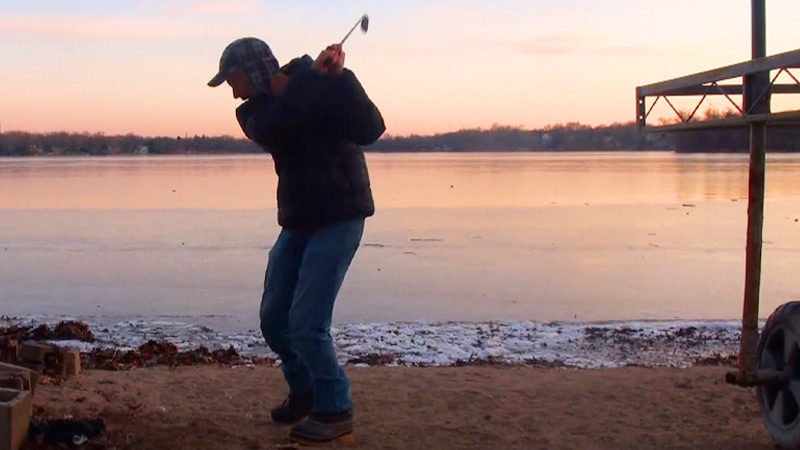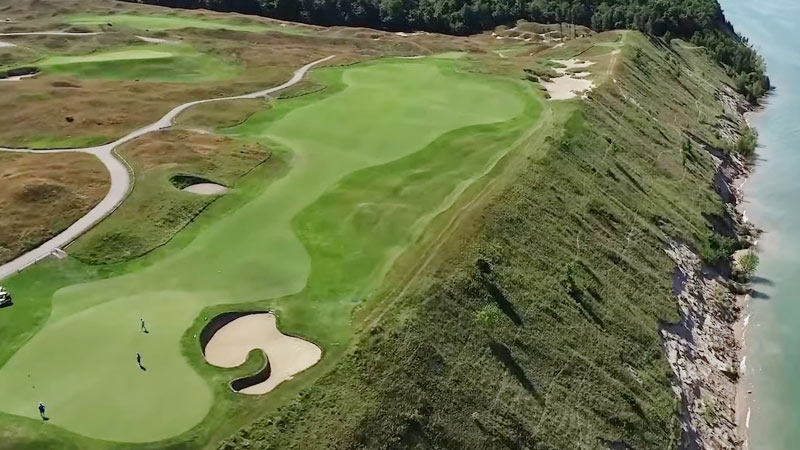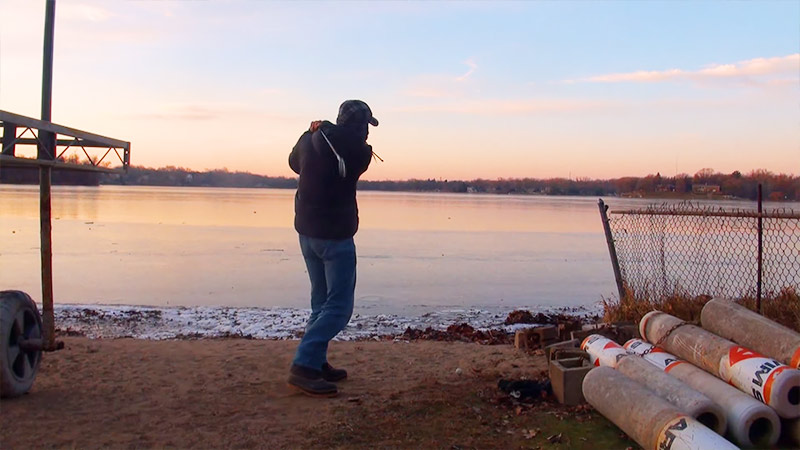Hitting golf balls into a lake may seem like a harmless practice, but its legality is a subject of concern in many places.
This seemingly recreational activity raises significant environmental, safety, and regulatory issues.
Crafted from non-biodegradable materials, golf balls contribute to pollution when submerged, jeopardizing aquatic ecosystems.
Beyond environmental impact, safety concerns arise from the high-speed projectiles posing risks to people and animals.
Moreover, numerous regions have implemented regulations to preserve the environment and public safety, prohibiting the act.
This prompts a reflection on the responsible and ethical use of golf courses, highlighting the interconnectedness of leisure activities with broader ecological and legal considerations.
Is It Illegal to Hit Golf Balls Into a Lake?
Yes, hitting golf balls into a lake or any other public body of water is generally considered illegal in many places due to various compelling reasons.
Here are the reasons why is it legal to hit golf balls into a lake:
Littering and Environmental Impact
Golf balls are crafted from materials that resist decomposition, such as synthetic rubber and plastic.
When these non-biodegradable balls find their way into bodies of water, they contribute to pollution and pose a threat to the aquatic environment.
The slow breakdown of these materials can release toxins, further compromising the health of the water and its inhabitants.
Safety Concerns

Beyond the environmental impact, hitting golf balls into lakes or other water bodies raises significant safety concerns.
The high-speed projectiles can pose a risk to people and animals in the vicinity, potentially causing injury or damage to property.
Regulations and Local Laws
Many regions have established regulations and local laws to safeguard the environment and public safety.
Prohibiting the act of hitting golf balls into bodies of water is a common measure to prevent the negative consequences associated with this practice.
Respect for Nature and Wildlife
Engaging in activities that disrupt the natural ecosystem or disturb wildlife is generally discouraged.
Golf courses are meticulously designed with specific playing areas, and intentionally hitting balls into water bodies contradicts the intended use of the course, showing a lack of respect for the natural surroundings.
Negative Impact on Water Quality
The presence of golf balls in bodies of water can have a direct and negative impact on water quality.
The materials from which golf balls are made may leach chemicals into the water, affecting the overall ecological balance and potentially harming aquatic life.
This degradation in water quality can have cascading effects on the entire ecosystem.
Economic Impact
Golf balls lost in water bodies represent a financial burden on golf course management.
The cost of replacing lost balls can accumulate over time, affecting the economic sustainability of the golf course.
This financial strain can, in turn, impact the quality of services and amenities provided by the golf facility.
Aesthetic and Recreational Disruption
Hitting golf balls into lakes can disrupt the aesthetic appeal of the golf course and its surrounding areas.
Floating or submerged golf balls are not only visually unappealing but can also interfere with recreational activities, such as boating or fishing, diminishing the overall experience for other users of the water and adjacent areas.
Legal Liability and Fines
Engaging in activities that violate local laws and regulations, such as hitting golf balls into water bodies, may result in legal consequences.
Golfers who disregard these rules could face fines and legal liabilities, further emphasizing the importance of adhering to established guidelines for the responsible use of golf courses.
Community Relations
Golf courses are often integral parts of communities, and negative actions like hitting golf balls into lakes can strain community relations.
Such behavior may lead to public dissatisfaction and diminish the positive image that golf courses strive to maintain within their local communities.
Can You Hit Golf Balls Into a Lake in Michigan?

In Michigan, as in many other places, hitting golf balls into a lake or any public body of water is generally discouraged and often regulated due to various concerns.
While specific rules may vary depending on the golf course and local regulations, there are common reasons why hitting golf balls into lakes is discouraged in Michigan.
Environmental Conservation
Michigan, known for its abundant natural resources, places a strong emphasis on environmental conservation.
The materials used in golf balls, such as synthetic rubber and plastic, are not biodegradable and can pose a threat to the delicate balance of aquatic ecosystems.
Authorities in Michigan are likely to discourage activities that contribute to water pollution and environmental harm.
Water Quality Protection
The state has a vested interest in maintaining the quality of its lakes and water bodies.
Hitting golf balls into these bodies of water may lead to the release of toxins as the balls break down, potentially compromising water quality and harming aquatic life.
To protect the integrity of Michigan’s water resources, regulations, and guidelines may be in place to discourage or prohibit such practices.
Safety Regulations
Michigan, like other states, places a priority on public safety. Hitting golf balls into lakes can create safety hazards for individuals enjoying the water, such as swimmers, boaters, or anglers.
Consequently, there may be regulations in place to prevent accidents and injuries caused by golf balls entering water bodies.
Compliance with Local Golf Course Rules
Individual golf courses in Michigan may have specific rules and policies regarding hitting golf balls into lakes.
These rules are designed to ensure the responsible use of the golf course and protect the natural environment.
Golfers are typically expected to adhere to these guidelines to maintain the integrity of the course.
Why People Hit Golf Balls Into Lake?

People hit golf balls into lakes for various reasons, and the motivations behind this activity can vary among individuals.
Here are some common reasons why people may choose to hit golf balls into lakes:
Practice and Recreation
Golfers often use lakes as practice targets to enhance their skills. Hitting shots over water requires precision and control, offering a different challenge compared to standard driving ranges.
Practicing with water hazards helps golfers simulate real-game scenarios and improve their overall game.
Entertainment and Challenge
Golf is not just a sport; it’s also a form of entertainment. Hitting golf balls into lakes adds an element of excitement and challenge to the game.
Golfers may find the risk-reward aspect of aiming for a target surrounded by water thrilling, making the overall golfing experience more enjoyable.
Relieving Stress or Frustration
Golf can be a mentally demanding sport, and players may experience moments of frustration or stress during a round.
Hitting balls into a lake can serve as a therapeutic outlet, allowing golfers to release pent-up emotions in a relatively harmless manner, giving them a brief respite from the pressures of the game.
Tradition or Ritual
Some golf courses may have designated areas where hitting into a lake is not only allowed but encouraged.
This can become a tradition or ritual associated with the course, fostering a sense of camaraderie among golfers and adding a unique aspect to the golfing experience.
Part of Golf Course Design
Golf course architects strategically incorporate water hazards into the design to make the game more challenging and visually appealing.
Lakes can be positioned to test a golfer’s decision-making skills, adding strategic elements to the course.
Hitting into these water features is, therefore, an integral part of the intended golfing experience.
Experimentation and Testing
Professionals and equipment enthusiasts might utilize lakes as testing grounds. Experimenting with different types of golf balls or clubs over water can provide insights into their performance characteristics.
This real-world testing helps golfers make informed decisions about their equipment, ensuring that it aligns with their playing style and preferences.
FAQS
Is hitting golf balls into a lake illegal?
In many places, yes. It’s often considered illegal due to environmental and safety concerns, as well as potential violations of local regulations.
Can I hit golf balls into a lake?
While it might seem like a recreational activity, it’s generally discouraged and may be illegal. Check local regulations and golf course rules for specific guidelines.
Are golf balls bad for lakes?
Yes, golf balls are typically made of non-biodegradable materials that can harm the environment. They contribute to pollution and pose a threat to aquatic ecosystems.
What are the consequences of hitting golf balls into a lake?
Beyond potential legal issues, it can harm the environment, negatively impact water quality, pose safety risks, and disrupt the aesthetics of the area.
Is hitting golf balls into a lake environmentally friendly?
No, it’s generally not environmentally friendly. The materials in golf balls can release toxins and contribute to pollution, harming the natural balance of lakes and water bodies.
To Recap
The prohibition on hitting golf balls into lakes extends beyond a mere legal restriction; it encapsulates a commitment to environmental stewardship, public safety, and respect for designated spaces.
The consequences of this seemingly innocuous act ripple through ecosystems, water quality, and economic considerations for golf courses.
Adhering to regulations is not just a legal obligation but a demonstration of responsibility towards nature and the community.
Encouraging golfers to utilize designated areas for practice aligns with a holistic approach to leisure, ensuring the preservation of both the golfing environment and the broader ecosystems that intersect with these recreational spaces.
Responsible golfing practices ultimately harmonize recreation with environmental and societal well-being.







